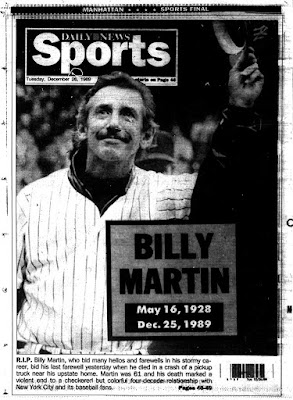 |
| Johnny in front of the original Lindell Bar |
In 1949,
Greek immigrant Meleti Butsicaris with his sons—Johnny and Jimmy—leased the
ground floor of the run-down Lindell Hotel and opened their bar on Cass and
Bagley avenues. At first, they couldn’t afford to have a sign made with a
different name, so they went with the hotel’s signage and called their tavern
the Lindell Bar and the name stuck. The bar was near Briggs Stadium, where the
Tigers and Lions played, and the Olympia arena, home of the Detroit Red Wings.
Legend has
it that a young New York Yankee second baseman—Billy Martin—suggested to the
brothers they change the drab atmosphere of the bar with an athletic theme.
That would not be difficult. In addition to being co-owner of the bar, Johnny
Butsicaris was also the official photographer for the Olympia. He had
plenty of original sports photographs he could use. It was not
long before sports memorabilia adorned the walls with autographed photos of Detroit
sports stars, signed team jerseys, bats, and hockey sticks--even a jock strap
belonging to Wayne Walker, a Detroit Lion linebacker. The new look helped
define the bar’s clientele.
 |
| Jimmy with Andre the Giant. |
The Lindell
soon became a hangout for Detroit sports figures and players from visiting
teams. It wasn’t long before local sports writers and celebrities performing in
Detroit found a home at the Lindell. National celebrities like Milton Berle and
Jayne Mansfield would stop in. Local celebrities like Detroit’s favorite
weatherman Sonny Eliot and Detroit News
sports columnist Doc Greene were regulars. Even the Beatles and their entourage went to the bar after their Olympia concert.
The
most notorious event in the history of the original Lindell Bar was a publicity
stunt for a wrestling match between Detroit Lion defensive tackle Alex Karras and
wrestler Dick the Bruiser. Karras needed the cash since he was no longer drawing his NFL salary. The week before, Karras was suspended from the NFL for the 1963 season for admitting he bet on football games.
 |
| Karras and the Bruiser in publicity still. |
The
Butsicaris brothers took Karras on as a business partner with his $30,000 from
the wrestling match. After the bar brawl, the three partners moved the location of the bar to Michigan
and Cass avenues. They had no choice. The Lindell Hotel was condemned and
scheduled for demolition.
Detroit News sports reporter Doc Greene suggested
adding AC (Athletic Club) after the new bar’s name as a sly reference to the Detroit Athletic Club, an exclusive members-only club. Only the
city’s business elite and socialites were members. Even famous sports figures could not enter
the club without a special guest invitation from a member.
Doc Greene
got many of his exclusive sports stories sitting at the original Lindell Bar. He did not want his bosses to know how much time he spent there getting his exclusive stories. In his Detroit News sports articles, he would write he was interviewing
this or that athlete at the Athletic Club. It became an inside joke at the bar.
Greene would call his wife and say he would be home soon when he was finished
at the Athletic Club. As a tribute to Doc Greene, the reincarnated Lindell Bar
became the Lindell AC.
Johnny’s son
Mel Butsicaris remembers working the night an elephant was brought into the
sports bar.
 |
| Sonny Eliot behind the bar at the Lindell AC. Photo courtesy of Mel Butsicaris. |
“The most talked about photograph in the bar was not of an athlete or
celebrity. Back in the 1970s, Bell Telephone and the Yellow Pages had a
slogan about an elephant never forgetting, but you have the Yellow Pages for
help. They were making a commercial across the street with a baby elephant.
 |
| Sonny Eliot |
"You don’t
see an elephant in downtown Detroit too often, so my dad and I walked over to
watch. My dad told the film crew to come over to the bar and he’d buy everyone
a drink. As a joke, my dad said while petting the elephant, ‘Bring your friend
along.’ About an
hour later, the front door opened with this guy pushing this beast through the
door. We still can’t believe it, but the elephant fit through. We worried if
the floor could handle the weight. Everyone
had a good laugh when Sonny Eliot started giving the elephant Coca-Cola to
drink. Shortly after, the Coke acted as a laxative for the animal. We used snow
shovels to clean up the mess.”
 |
| Alex Karras and Curtis Yates |
In 1980, CBS
filmed a made-for-television movie in the Lindell AC bar called Jimmy B. and Andres. It was based on the
true story of Jimmy Butsicaris, who wanted to adopt an African-American boy.
Alex Karras starred with his wife Susan Clark, and as the young boy, Curtis
Yates. The bar was sanitized as a restaurant for the movie. The spin off became
the ABC sitcom Webster with Emmanuel
Lewis playing the child’s role.
Jimmy
Butsicaris died in 1996, and his brother Johnny died in 2011. The Lindell
AC sports bar, said to be the first in the nation, closed its doors in 2002. The
building was scheduled for demolition to make way for the Rosa Parks Transit
Center.
More information on the Alex Karras/Dick the Bruiser bar brawl:


